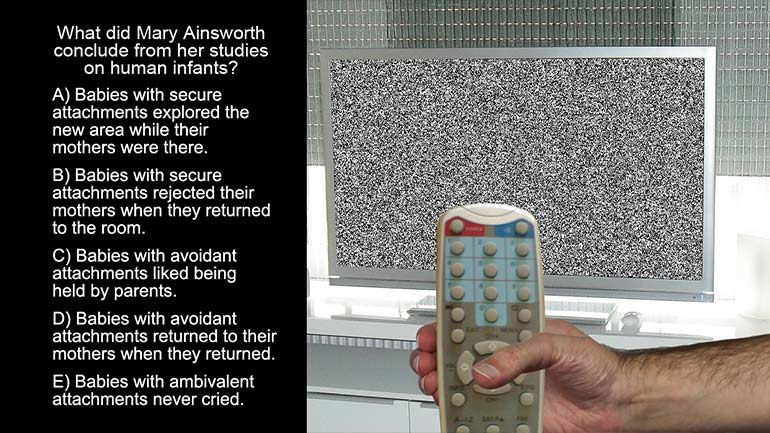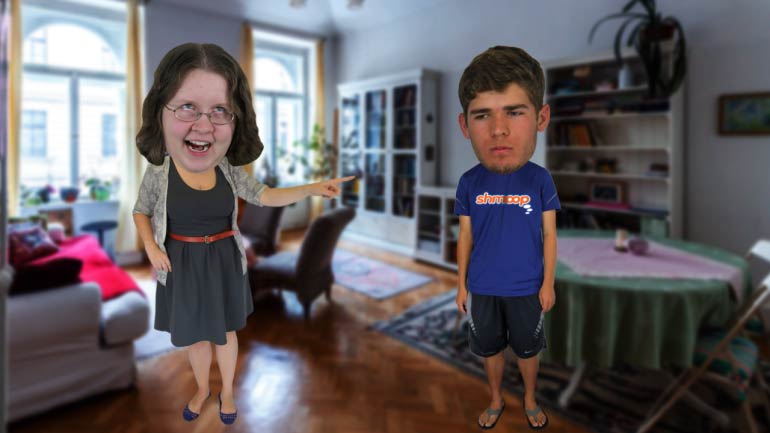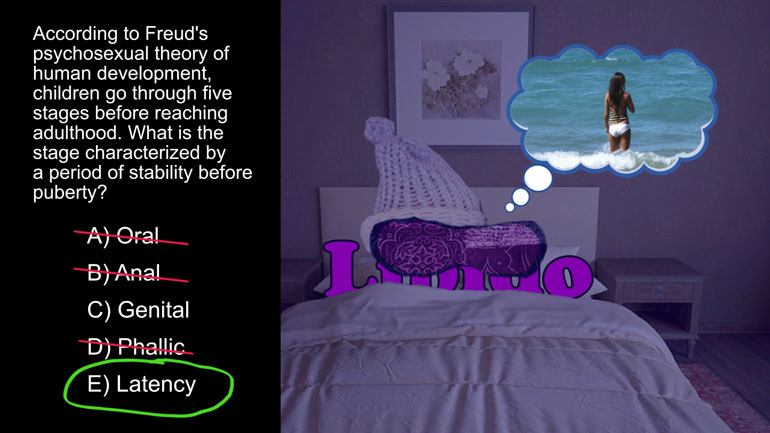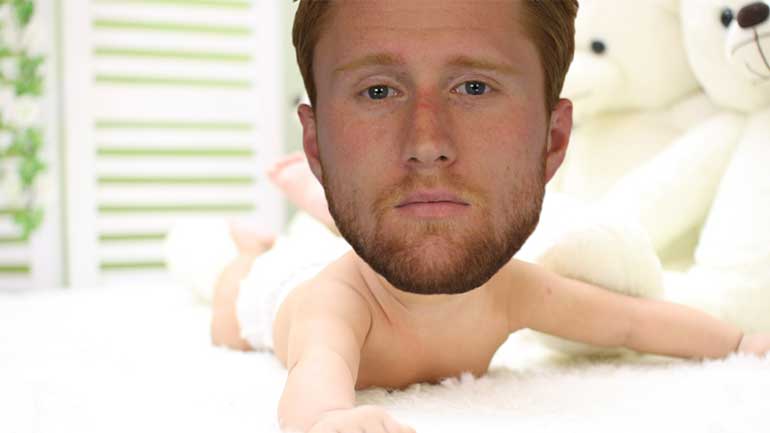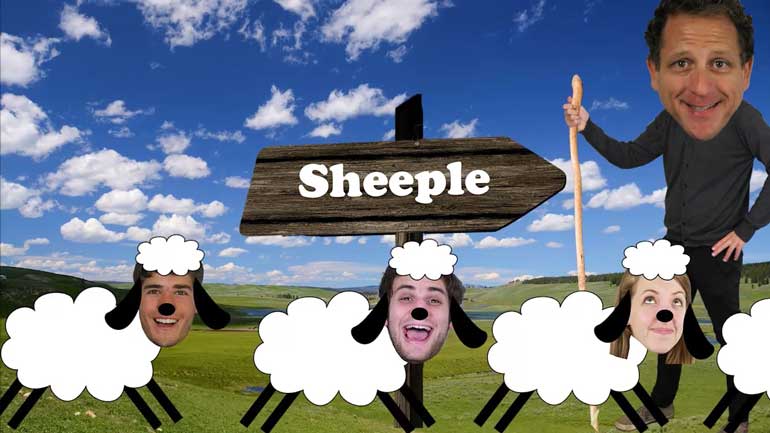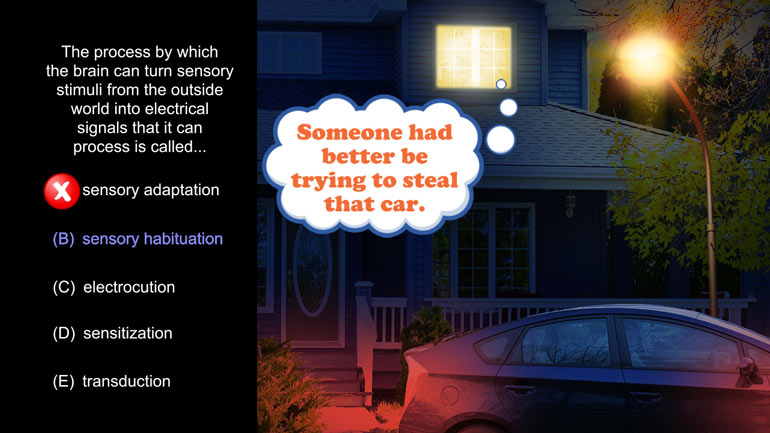ShmoopTube
Where Monty Python meets your 10th grade teacher.
Search Thousands of Shmoop Videos
Key Contributors Videos 5 videos
AP Psychology 2.3 Developmental Psychology. What did Mary Ainsworth conclude from her studies on human infants?
AP Psychology 3.4 Developmental Psychology. Which of the following labels best applies to Erik Erikson?
AP Psychology 3.3 Developmental Psychology. In which stage does a person decide their work-life balance and how to have healthy relationships?
AP Psychology 2.5 Developmental Psychology 38 Views
Share It!
Description:
AP Psychology 2.5 Developmental Psychology. What is the stage characterized by a period of stability before puberty?
Transcript
- 00:00
Here's your shmoop du jour brought to you by the five stages of
- 00:07
human development we have an extensive whoopee cushion collection so we'll [People in meeting and whoopee cushion goes off]
- 00:11
leave it up to you yes what stage where else all right according to Freud
- 00:14
psychosexual theory of human development children go through five stages before
- 00:19
reaching adulthood what is the stage characterized by a period of stability
Full Transcript
- 00:23
before puberty and here the potential answers
- 00:27
Freud was a little weird but he is your
- 00:32
mother or a father of psychoanalysis anyway Freud felt the libido for sexual [Freud wearing a wig and wig disappears]
- 00:38
drives or instincts of the individual manifested themselves around different
- 00:42
areas of the body depending on the stage of psychosexual development the first
- 00:47
stage of the oral stage and no giggling near people which occurs in the first
- 00:52
year of life and describes how babies satisfy their libidos and the demands of
- 00:56
it by sucking biting and breastfeeding well Freud also said that oral [Freud sucking on a dummy]
- 01:00
stimulation in this stage could lead to an oral fixation later in life which we
- 01:04
see manifested in behaviors like smoking biting nails sucking thumbs chewing on [Man chewing on door knob]
- 01:08
doorknobs and will anything at all doesn't have to be sexual yeah so it's
- 01:12
not our answer next up comes the anal stage what do we say about giggling
- 01:16
there be able to month occurring from age 1 to 3 this stage focuses on how the
- 01:20
libido shifts to the anus suggesting the children derive their pleasure from
- 01:24
defecation or at least jokes about it and that the ship was related to the [Man making joke on stage]
- 01:30
strong emphasis on potty training during this period we're really not sure who
- 01:34
Freud studied to come to this conclusion maybe he volunteered at a daycare for a [Freud at a day care center]
- 01:39
few years but yeah it still happens too early to be what we're looking for in
- 01:42
this question next up the phallic stage while lasting [Woman pointing a banana]
- 01:45
from age 3 until around 6 this stage concentrates on the genitals of both
- 01:50
sexes and describes period when children become aware of their anatomical
- 01:54
differences this includes Freud's idea about girls having penis envy and boys [Freud thinking of penis envy and boys carrying knives]
- 01:58
wanting to kill their dads in order to replace them and a whole lot of other
- 02:02
stuff like that that tends to get dismissed as you're selling it come on
- 02:06
Fry don't pin your personal issues on the rest of
- 02:09
then comes the latency stage of stage at last around six until puberty
- 02:13
ding-ding-ding this is a stage where no psychosexual development is said to take
- 02:18
place where the libido is supposedly dormant and repressed until puberty and [Libido sleeping in bed]
- 02:22
yep that's the answer we want it but just for grins and giggles final stage
- 02:26
begins at puberty and lasts through adulthood it's known as the genital
- 02:30
stage and describes adolescent sexual experimentation and settling down into [Man and woman holding hands]
- 02:35
loving one-on-one relationship or an unhealthy obsession with fart joke [Freud holding whoopee cushion]
Related Videos
AP Psychology 2.2 Social Psychology. Which of the following was an independent variable manipulated in Asch's research?
AP Psychology 1.1 Personality. According to Freud, these three parts of personality are constantly in conflict.
AP Psychology 1.1 Sensation and Perception. The process by which the brain can turn sensory stimuli from the outside world into electrical signals...
AP Psychology 1.1 Social Psychology. Which of the following best describes social psychology?
AP Psychology 1.1 States of Consciousness. Who conducted research on REM sleep deprivations?
